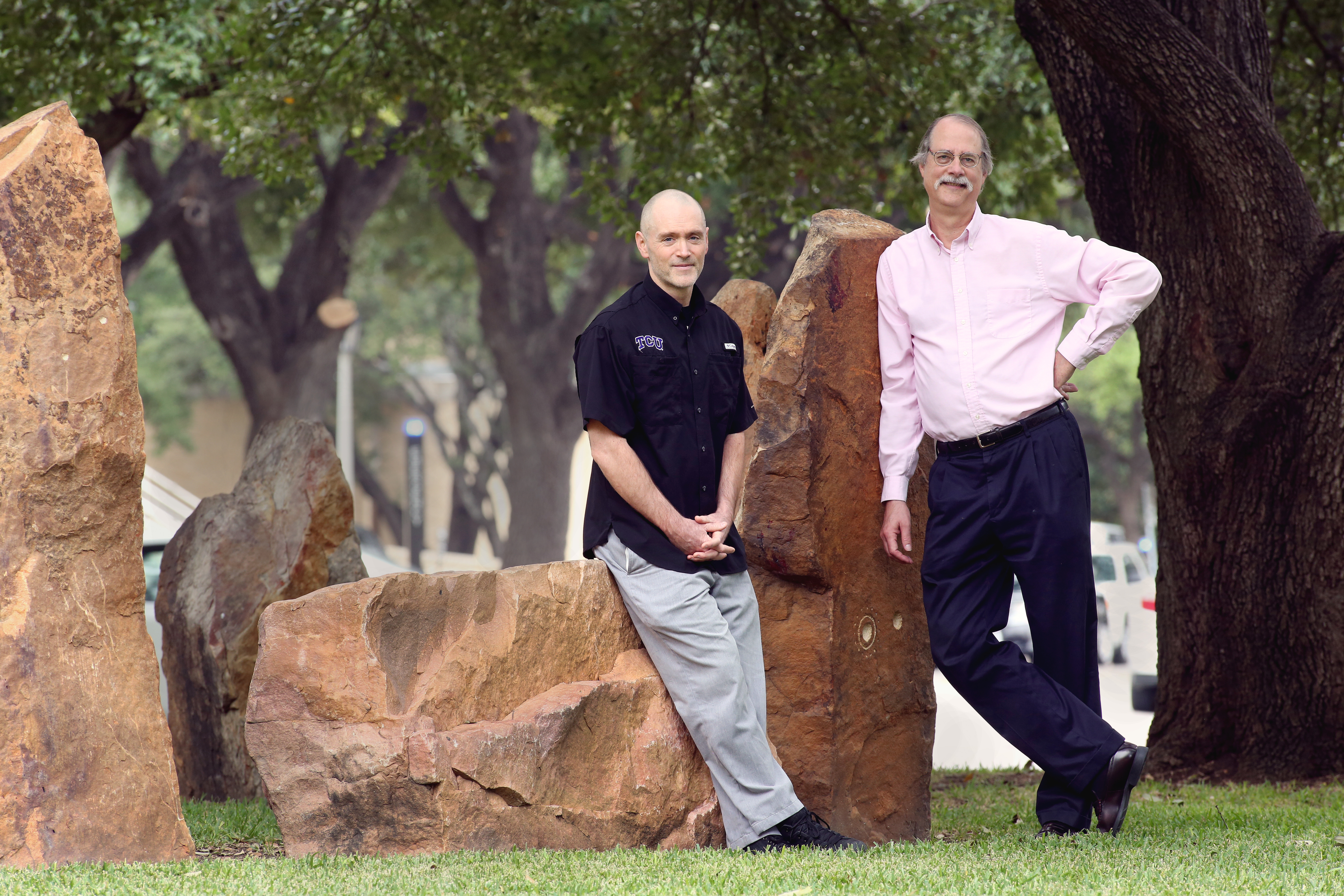Religion and Philosophy Professors Want to Help Students Flourish Through Meditation and Mindfulness
Headed by Mark Dennis, Ph.D., and Blake Hestir, Ph.D., the CALM Studies group has been helping TCU students, faculty and staff learn meditation and mindfulness techniques since 2016. Beginning in the spring 2023 semester, professors Dennis and Hestir will be teaching a class, The Art and Science of Human Flourishing (ASHF), “concepts and ideas around the nature of flourishing as well as the neuroscience of meditation” to students.
Hestir and Dennis spoke about how CALM Studies began, the science behind contemplative studies and their goals for the new class.
How did the TCU CALM Studies group get started?

CALM stands for “Compassionate Awareness and Living Mindfully.”
The TCU CALM Studies group (originally TCU Contemplative Studies) was founded in 2012 by then-professor Andy Fort, who was a specialist in South Asian religions. After professor Fort's retirement, we took over as director (Dennis) and associate director (Hestir). We many years of experience with contemplative practices personally and as certified mindfulness meditation teachers.
The CALM Studies student group formed in 2018 and it is now an officially-recognized campus student group.
What is Contemplative Studies?
Contemplative studies investigates the underlying philosophical, psychological and scientific bases of human contemplative experience. Students pursue an academic approach drawn from the humanities and sciences to analyze the cultural, historical and scientific underpinnings of contemplative experiences in religion, art, music and literature. In combination with a “critical first-person” approach based on practical experience of contemplative techniques, students learn of the role of contemplative thought and experience in societies and on individuals.
While most of these practices emerged from religious and philosophical traditions, many modern teachers have taken them and teach secularized versions to members of the healing professions, military and police, athletic world, and dance and performance, among others. Oftentimes, these groups turn to the practices for benefits, such as stress reduction, increased focus, and so on.
What has the scientific community found about the benefits of meditation and mindfulness practices?
Over the last decade-plus, there has been an explosion in well-funded research exploring the benefits of meditation and mindfulness practices.
Research has become more nuanced in determining how particular practices affect certain parts of the brain. We are also gaining a better understanding of the broader physiological, emotional and mental effects of these practices.
"Our goal is to teach students about the concepts and ideas around the nature of flourishing as well as the neuroscience of meditation." - Mark Dennis, Ph.D. and Blake Hestir, Ph.D.
There has also been growing interest among researchers in determining how these practices affect conditions, whether depression, anxiety, ADHD and disordered eating.
The Flourishing Academic Network (FAN) is the hub for much of the ongoing research around meditation and mindfulness practices. The CALM study group recently joined FAN. We are proud that TCU joins institutions such as University of Wisconsin-Madison, Penn State, UVA, Stanford, the University of Toronto, Brown, Johns Hopkins and others in taking the lead in this growing field of research and education.

How has CALM grown across TCU over the years?
Since the group’s start, we have cultivated relationships with partners across TCU: in AddRan College, Neeley School, Fine Arts, Education, Honors, the Burnett School of Medicine, Harris College and Science & Engineering.
The group has offered regular campus programming that is always at no charge and is open to members of the TCU community and beyond. These programs include regular meditation sessions and retreats, films, panels, and guest speakers. Speakers include professor John Dunne, who is the Distinguished Professor of Contemplative Humanities in the University of Wisconsin’s Center for Healthy Minds. Mark studied classical Tibetan with him as a graduate student.
You are co-teaching a course in the spring semester called “The Art and Science of Human Flourishing” (PHIL & RELI 20203). Where did the idea for this course come from?
The Art and Science of Human Flourishing (ASHF) course was developed by the University of Wisconsin’s Center for Healthy Minds (CHM) in partnership with UVA and Penn State. All three institutions have researched the benefits students have received from the course. The CALM Studies group started holding discussions with John Dunne in 2017 about bringing ASHF to TCU. Dunne mentioned the course during one of his visits and we expressed an interest in bringing it to campus and making it available to TCU students, possibly as a wonderful complement to Introduction to University Life (UNLF).
We’re excited about its transformative potential for our students. Our spring 2022 pilot was successful but mostly enrolled juniors and seniors. In later iterations, we plan to target first-year students, which was the original intention behind creating the course at those institutions.
What do you hope to accomplish with students who complete the Flourishing course?
We hope the course will help students question and more deeply appreciate the purpose and transformative potential of their education at TCU. Like faculty members here and across academia, we are concerned by the pressure we see on students in a corporate-like university environment, and the knock-on effects that has on them.
"While we explore perspectives from the humanities and sciences in ways that are directly relevant to university life, we also focus on the benefits of contemplative practices drawn from a diversity of traditions that can help students develop qualities and skills...that are key elements of flourishing." - Mark Dennis, Ph.D. and Blake Hestir, Ph.D.
Our goal is to teach students about the concepts and ideas around the nature of flourishing as well as the neuroscience of meditation. The course teaches students the knowledge and skills with which each can start cultivating her or his vision of flourishing by introducing readings, contemplative practices, and intellectual, emotional, and even spiritual dispositions drawn from the humanities and sciences. Those materials elaborate on the ways in which a flourishing life can be understood and the array of practices that can become part of a tool belt they can use to realize a life of flourishing in college and beyond.
While we explore perspectives from the humanities and sciences in ways that are directly relevant to university life, we also focus on the benefits of contemplative practices drawn from a diversity of traditions that can help students develop qualities and skills—such as the capacity to manage distraction—that are key elements of flourishing. We do lots of practice in class but also need regular practice outside the classroom.
What is CALM future goals at TCU?
We have been fortunate to have developed partners across the university and they will be instrumental in helping us realize our goals of creating the CALM minor in the short term and the CALM Center for Student Flourishing in the long term.
We envision ASHF serving as the gateway course for the CALM minor that we aim to have in place for the fall 2023 semester.
